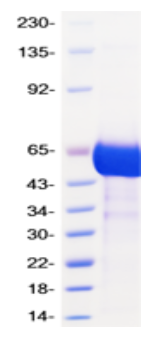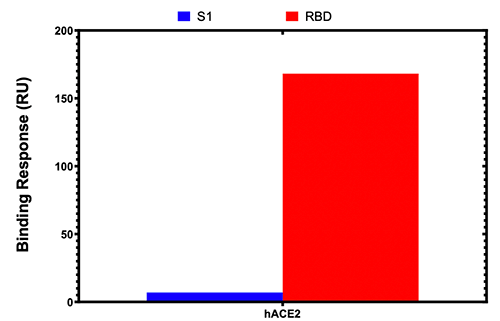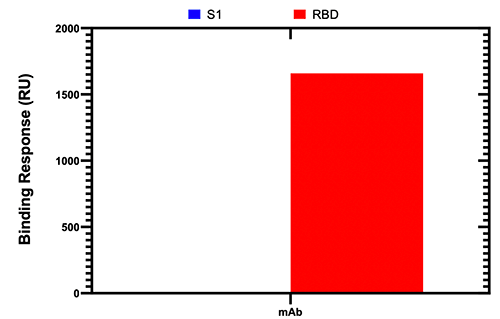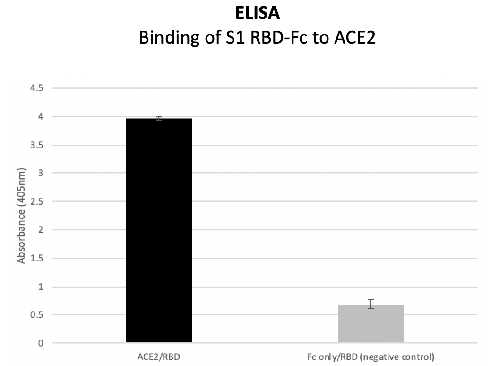Featured Product New!: Monoclonal Antibodies to Coronavirus SARS-CoV-2 RBD Domain
Description:2019 Coronavirus SARS-CoV-2 Spike S1 RBD Protein, human IgG1 Fc tag.
Reference: A highly conserved cryptic epitope in the receptor-binding domains of SARS-CoV-2 and SARS-CoV, Science 03 Apr 2020:eabb7269, DOI: 10.1126/science.abb7269
Product: Recombinant protein from the receptor-binding domain (RBD) of 2019 Spike S1 of Wuhan pneumonia virus (MN908947.3) SARS-CoV-2, with a human IgG1 Fc tag.
Cat #: LTP-V002
Host: Human cells
RefSeq: MN908947.3; QHD43416.1;
Molecular Weight: 52.3 kDa
Applications: Antigens, Western, ELISA and other in vitro binding or in vivo functional assays, and protein-protein interaction studies
Background:
The spike (S) glycoprotein of coronaviruses is known to be essential in the binding of the virus to the host cell at the advent of the infection process. Most notable is severe acute respiratory syndrome (SARS). The severe acute respiratory syndrome-coronavirus (SARS-CoV) spike (S) glycoprotein alone can mediate the membrane fusion required for virus entry and cell fusion. It is also a major immunogen and a target for entry inhibitors. The SARS-CoV-2 spike (S) protein is composed of two subunits; the S1 subunit contains a receptor-binding domain that engages with the host cell receptor angiotensin-converting enzyme 2 and the S2 subunit mediates fusion between the viral and host cell membranes. The S RBD protein plays key parts in the induction of neutralizing-antibody and T-cell responses, as well as protective immunity, during infection with SARS-CoV-2 (2019-nCoV) as in recent COVID-19 outbreak.
Quantity: 50 ug, >Endotoxin level is < 0.1 ng/µg of protein (<1EU/µg)
Purity: >90% by SDS-PAGE gel and Coomassie Blue staining
Formulation: Purified protein formulated in a sterile solution of PBS buffer, pH7.2, without any preservatives
Download Data File:
Download Progress Report:
SDS-PAGE & Biological Activity:: Predicted MW of this product is ~ 52 kDa when running on SDS-PAGE under the reduced condition

Goal: To assess the binding of anti-SARS CoV-2 RBD mAb, hACE2 and SARS CoV-19-infected Patient Sera to S1 and RBD Proteins
Methods: Oriented Capture and Covalent Immobilization of Ligands
- SARS CoV-2 S1 Spike Protein – Polyhistidine Tagged (LifeTein Product LTP-V006);
- SARS CoV-2 RBD Protein – Polyhistidine Tagged (LifeTein Product LTP-V009);
- Recombinant hACE2, human IgG1 Fc-Tagged (LifeTein Product LTP-V003)
- Anti-SARS CoV-2 Spike RBD mAb: Active Motif (Ab-LTA003) from COVID-19 patients who have cleared the virus. Patient serum IgG sequenced and expressed as full-length IgG1 with human immunoglobulin heavy and light chains in mammalian 293 cells
- Patient serum samples from COVID-19
- Normal Human Pooled Serum (NHPS)

Binding of hACE2 to S1 and RBD Proteins. The low binding of S1 and hACE2 could be caused by the closed SARS-CoV-2 S1 trimer.
Reference: Walls et al., 2020, Cell 180, 281–292, April 16, 2020, https://www.cell.com/cell/pdf/S0092-8674(20)30262-2.pdf

Binding of anti-SARS CoV-2 mAb (Ab-LTA003) to S1 and RBD Proteins
Summary:
- hACE2 binds strongly to RBD and slightly to S1
- mAb (Ab-LTA003) binds strongly to RBD but not to S1
- Normal Human Pooled Serum does not bind to RBD or S1 (Data not shown)
- Human Sera from SARS CoV-19 infected patients (PCR-confirmed) bind to RBD and minimally to S1 (Data not shown)
- The low binding of S1 and hACE2 could be caused by the closed SARS-CoV-2 S1 trimer


The S1 RBD binds to the ACE2 enzyme, using the Fc only as a negative control, which the RBD did not bind to. The assay was performed with an ELISA, detecting the RBD with streptavidin HRP.
 https://www.lifetein.com
100 Randolph Road, Suite 2D,
Somerset
USA
New Jersey
08873
https://www.lifetein.com
100 Randolph Road, Suite 2D,
Somerset
USA
New Jersey
08873
 https://www.lifetein.com
100 Randolph Road, Suite 2D,
Somerset
USA
New Jersey
08873
https://www.lifetein.com
100 Randolph Road, Suite 2D,
Somerset
USA
New Jersey
08873